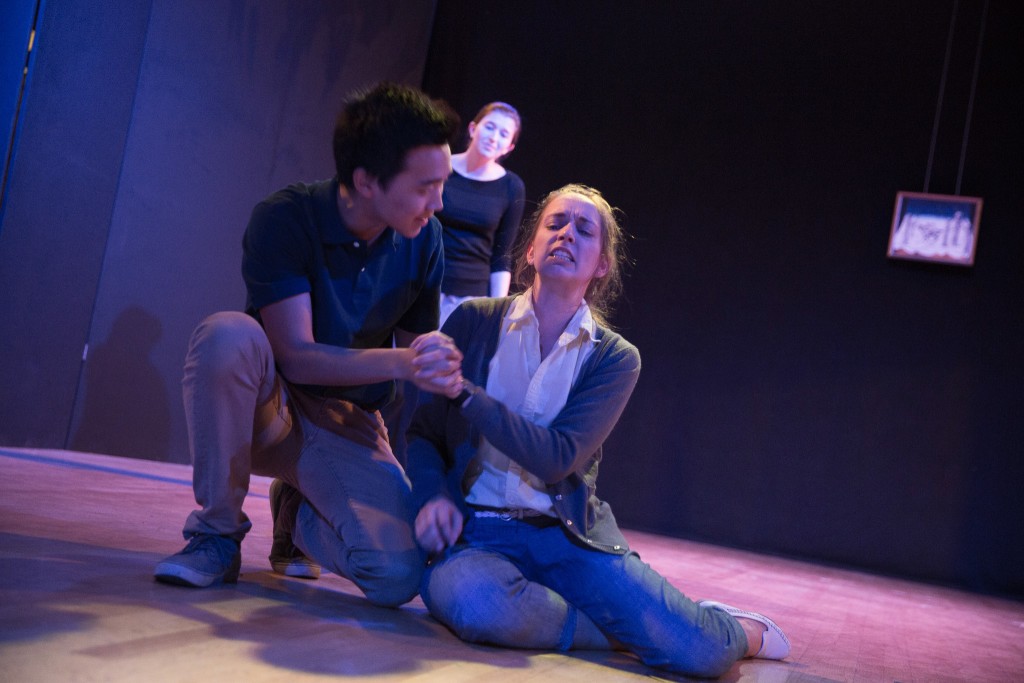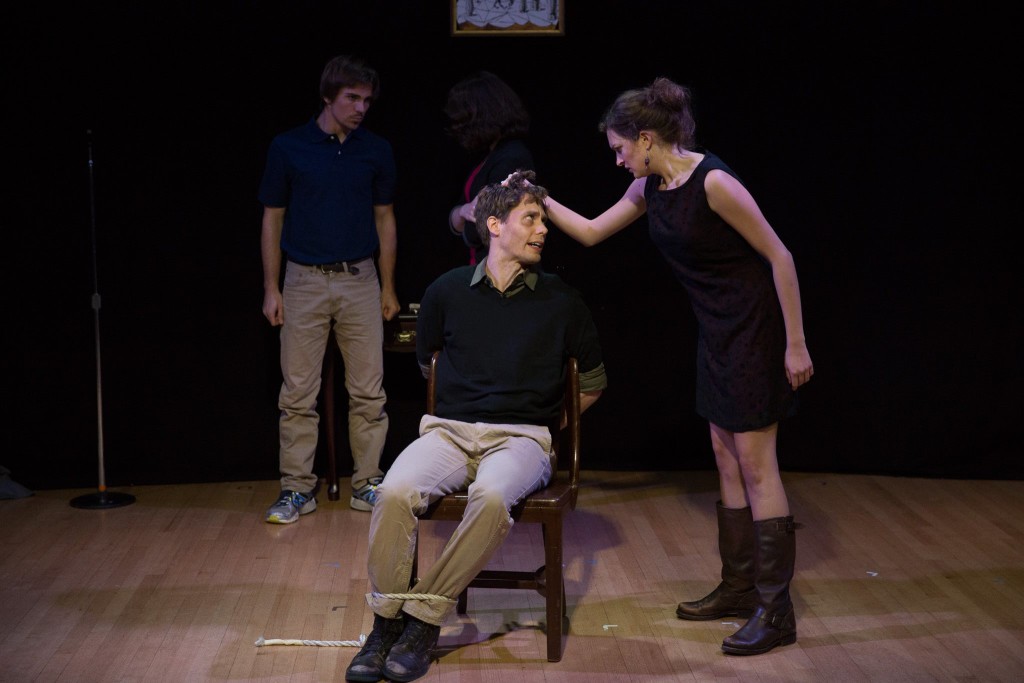
A woman snaps her head forward and her once crazed eyes clarify. She gazes down at the scene of death before her, crumpling to her knees and uttering out a guttural, mournful groan.
“Why should a dog, a horse, a rat, have life, and thou no breath at all?” she cries, shaking her head uncontrollably, spasmodically, desperately clenching her hands to her chest in an effort to dispel the pain that has broken through her cloud of madness. Surrounding her, bloody bodies juxtaposed with living beings full of anguish gaze upon the scene in despair. Edgar (Josh Petersen) sobs quietly, his face clenched in agony as Kent (Adi Chang) listlessly clutches a bilboquet and stares blankly at the loss before him.
The woman is Lear, played by Nora Tjossem, in The Stanford Shakespeare Company’s production that opens tonight at the Elliott Program Center. By combining a modern setting, original Shakespearean dialogue, and personal thematic influences, director Kevin Heller creates a new yet familiar world for the sixteenth century tale of British monarchy and convoluted artificial values to reside.
Major changes, aside from the modernization, include the casting of Lear (Nora Tjossem) and Edmund (Malaika Murphy-Sierra) as women, adding a new dimension to the previously male-dominated play. Tjossem’s madness as Lear is more delicate, more feeble, and steeped in a version of early onset dementia rather than the unknown craze of Lears, Lady Macbeths, and Hamlets past. There’s a basis to Lear’s madness that builds a stronger foundation for Tjossem to explore the character upon, and she does it beautifully. From wavering inflections in her voice to feeble movements that contrast with uncontrollable bursts of rage and forceful panic, you feel the terror that Lear endures. Murphy-Sierra’s Edmund is calculating and cold, a classic type of villain with an air of vulnerability that makes her trickery believable and her manipulation project upon the audience.

Although some diction issues cause a loss of comprehension, the performances of Lear are fueled by the tragic energy the play presents: tensions run high, emotions push characters over the edge, and the human experience is explored through questions of existentialism, artificial societal structures, and the art of truly knowing those you love. One particular striking performance is that of Petersen’s Edgar: pushed over the edge by his father Gloucester (Graham Roth), and being tricked by Edmund, he switches between two personas, a beggar feigning madness, and his true, volatile, and despairing self, as he tries to make sense of the tragedy that has befallen him. In a scene of ultimate existentialist despair, Petersen wavers between his two sides in a response to the overabundance of emotion, causing his father to ask why the crazy old beggar’s voice had changed. Full of intense soliloquies imbued with rage, passion, and sadness that cause him to crumble to the ground, Petersen’s Edgar holds human vitality and response in mind all throughout his performance.
StanShakes does a wonderful job of utilizing the entire available space. Characters traipse down the aisle, chasing after each other, gazing up into the heavens in intense thought, or confronting their problems with a gun and a knife. Cigarette smoke rises in the air from casual conversations outside the windows, and a mirrored wall on the stage left opens the space for all to see. The play is staged so intricately that no moment should be lost by blockage by the person in front of you. Despite periodic sound volumes that are a bit jarring for the small space, the technical design is precise and smooth. The lighting reflects different weathers and events with bright lights and subtle colors, and carries out the thematic elements of the show by playing with shades of blue during emotionally lost scenes and red during intense, rage filled soliloquies. The actors do not wear microphones, a smart choice for the small venue; this makes Lear feel more intimate and closer to the heart, rather than making it a grand spectacle full of swordplay and war.
Lear is a study of the human experience, bringing Shakespeare away from the days of “thou” and “thee” and into a domestic setting that we all can recognize. It makes us question the meaning of life and existence in the face of corruption and trickery, our humanity, what our societal pillars stand for and mean—but most of all, Lear asks us to lift the panel that we have sought out to ignore before time runs out. Knowledge and empathy are the keys to our existence, this play argues. But so many choose to ignore it.
Lear: 8p.m. Wednesday-Saturday. Elliott Program Center. Free tickets here.
Photo credits: Frank Chen
